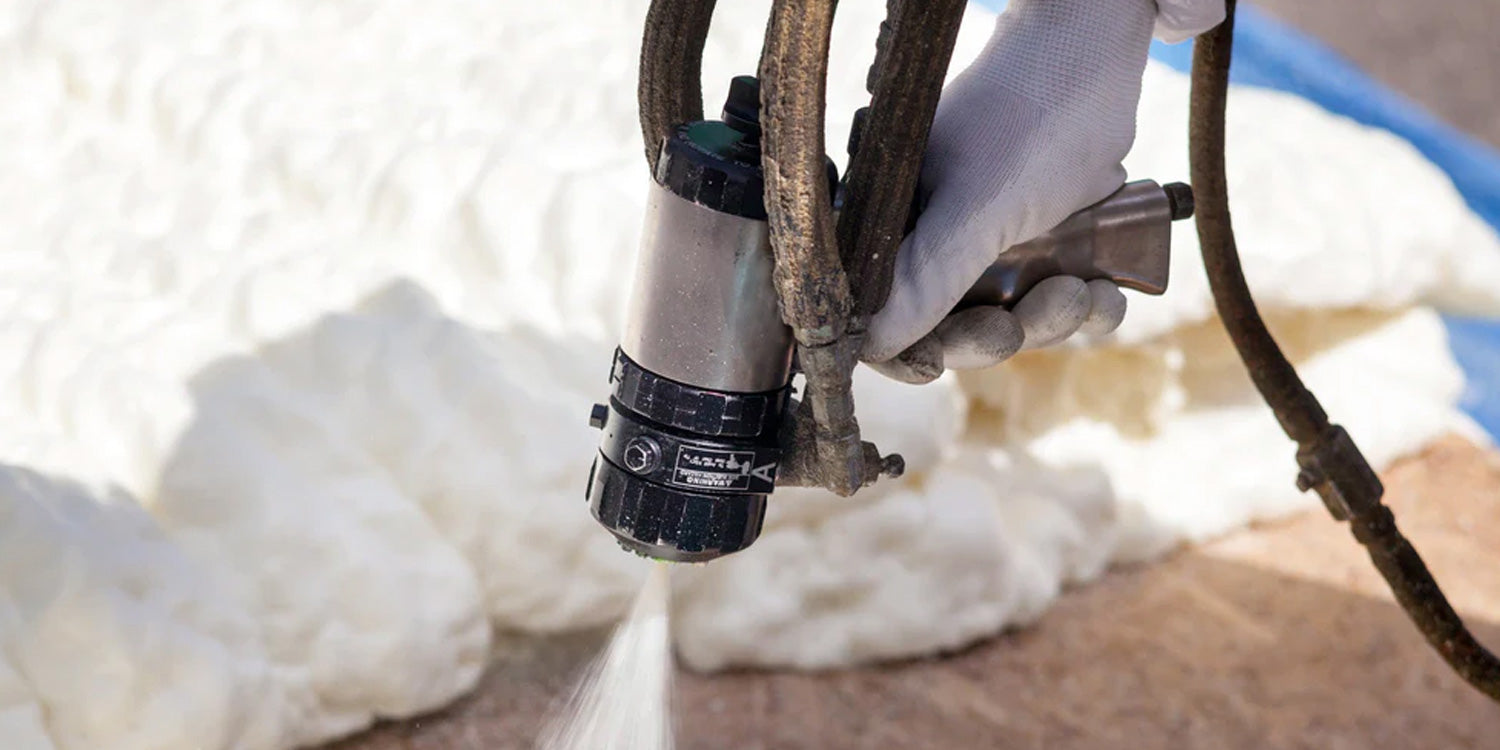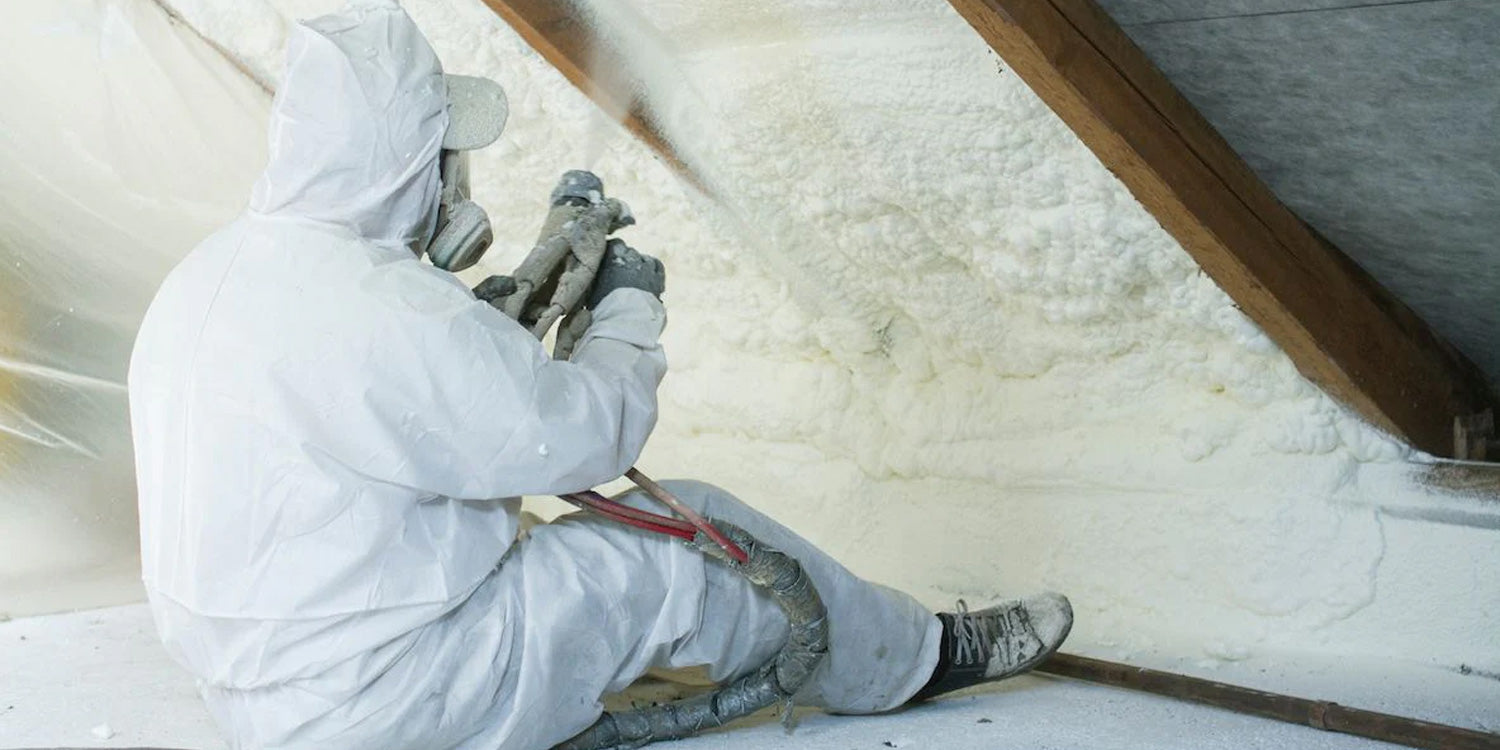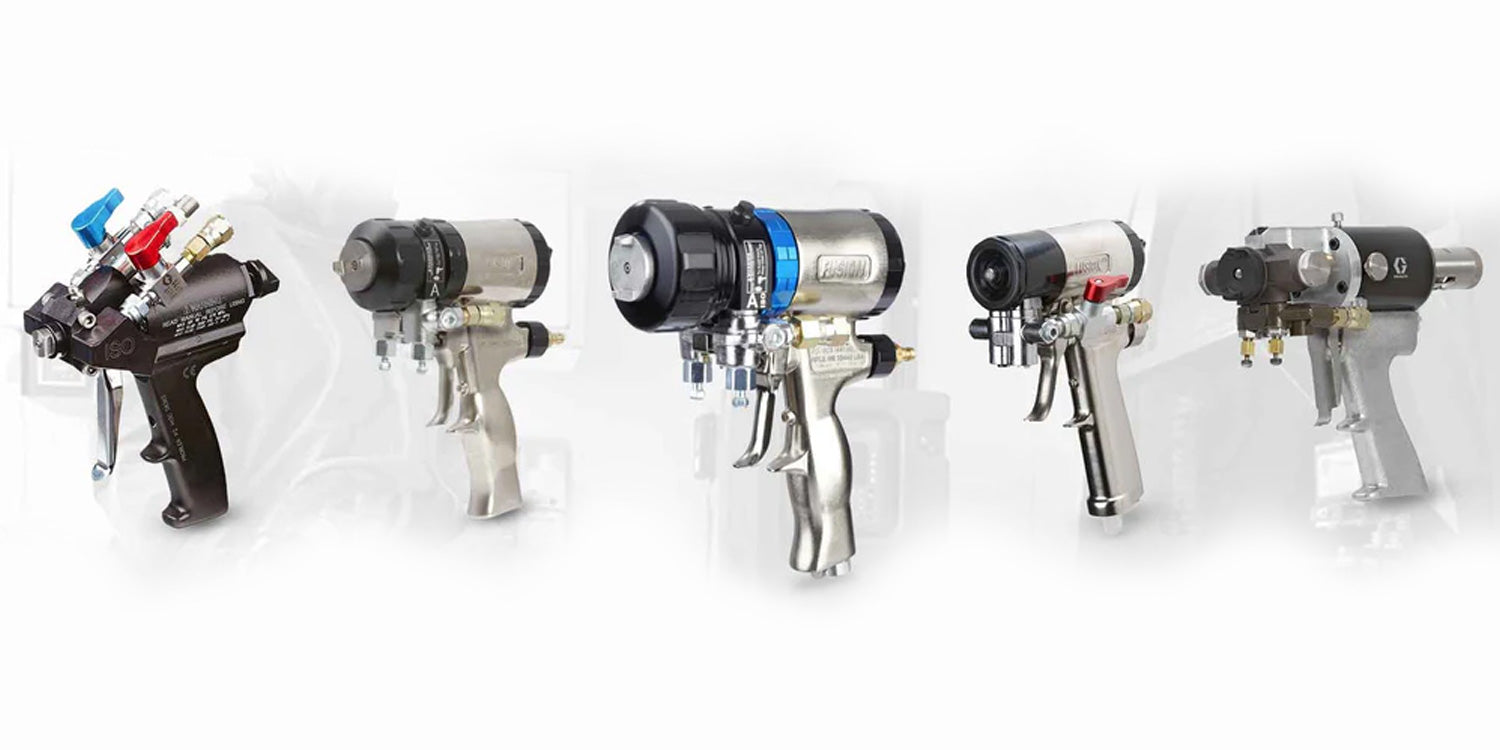Spray Foam Roofing Systems: Your Guide
Spray foam roofing systems are a growing trend in the commercial roofing industry. While traditional roofing systems, such as tar & gravel, metal (galvanized steel, aluminum, tile sheets, etc.) or synthetic rubber, are still more common – spray foam contractors across Canada are building commercial roofing into a profitable business line. However, many find a learning curve when introducing this offering, even if you’re already running a successful residential spray foam insulation business.
Whether you’re looking to enter the spray foam roofing industry for the first time or if you’re an experienced contractor staying up to date on the latest trends, here are some factors you should be considering that will help you book more roofing customers and feel more prepared for your jobs:
- Benefits of spray foam roofing systems
- Your target market
- Resources needed
- Challenges faced
- Maintenance & warranty
Benefits of spray foam roofing
If you’re entering the spray foam roofing business for the first time – and even if you’re an experienced spray foam contractor –understanding the benefits of these innovative systems will help you educate your clients, build profitable quotes and get more customers to sign on the dotted line. So why are spray foam roofing systems emerging as a popular choice for commercial buildings?
- High r-value - Although property owners typically have a choice between closed-cell and open-cell insulation for interior projects, roofing systems always use closed-cell spray foam insulation to keep water out of the building. Closed-cell insulation has an r-value of 5.5 – 6.5 per inch, offering building owners significant energy savings over the lifetime of their roof.
- Quick and easy installation – Because spray foam application is easy to customize, you can complete installation in a fraction of the time compared to other roofing materials. You can apply spray foam in just a few minutes around complex areas such as skylights, vents or pipes, whereas it might take 30 – 60 minutes to cut other roofing materials to fit.
- Simple maintenance – Commercial building owners love how easy it is to maintain their spray foam roofing system. When traditional roofing systems need repairs, it often leads to an extensive, loud and cumbersome job, while most spray foam roofing maintenance can be performed quickly and with minimal disruption.
Your target market
Because many contracting business owners do their marketing in-house, it’s essential to target your business development efforts. Here are the best opportunities for your services:
- Commercial buildings. Spray foam roofing isn’t as aesthetically pleasing as traditional roofing, so it’s rare to see it on a home. While we think this will change over the next ten years, commercial buildings are your best bet in the meantime. The risk of overspray is higher in residential areas since you have less leverage to ask other homeowners to move their vehicles.
- Buildings with extensive flashing. Spray foam’s flexibility is one of its best features. And building owners appreciate how much it expedites their job. You can apply spray foam to complex areas like skylights, vents or parapet walls in a fraction of the time it would take to use metal or rubber flashing.
- Windy or wet regions. Wind can cause significant damage to traditional roofing systems – a rough day of weather can cause the roof to separate at its seams, ultimately allowing water to enter next time there’s a storm. Because spray foam roofing systems don’t have seams like traditional roofing materials, the risk of ripping during weather events is lower. And if it does happen, you can apply another layer of foam and silicone on top.
Resources
Spray foam roofing is a profitable business line for many contractors. But it does require some investment. If you’ve been offering residential spray foam contracting for a while, you likely either have your rig set up or have been seriously considering getting one for a while. But if not, or if some of your equipment is due for an upgrade, now is the time to look into replacing aging hardware or investing in a new rig.
Here's what you’ll need:
- Rappelling gear (and a course!). Roofing systems add a layer of safety complexity to the job equation. And it’s essential to keep your whole crew secure.
- Ladders and potentially a boom lift to access the roof safely. You may need to rent a crane or hoist for jobs over a certain height.
- Infrared camera to check for moisture and insulation quality.
- Power washer to clean the roof before applying the membrane.
- Polyester mesh, silicone coating and rollers to apply the protective membrane on top of the spray foam.
Challenges
Avoid some of the stresses contractors sometimes encounter when installing spray foam roofing systems by keeping these challenges in mind:
- Existing roof conditions. Spray foam roofing can be installed over one existing roofing system – but not over two. And it must be installed over dry insulation. Ensure that you conduct a thorough inspection to scope the project accurately. When you first start your business, you may want to consider having a third-party inspector join you for the preliminary walk-through to minimize the risk of missing something.
- Weather windows – Interior spray foam insulation can be applied in any season; spray foam roofing systems are more temperamental. Like all roofing, it’s typically completed on warm summer days – which somewhat limits Canadian contractors. And you’ll need to reschedule any rainy or high wind days. Make sure you block off a few extra days to account for weather conditions.
- Overspray – While most spray foam contractors find this gets easier over time, overspray is an annoying challenge you may encounter. To avoid spending time and money removing overspray from cars, ensure that the building owner advises anyone who typically parks near the building to find a spot elsewhere while you install the roof.
- Pricing – If you’re in the contracting industry, we’d be surprised if you weren’t tired of hearing about the supply chain. But we must warn you that spray foam roofing systems have their share of supply chain challenges – from rental equipment shortages to labour market shortages to fluctuating chemical prices and everything in between. You’ll need to be prepared and plan ahead to minimize the impact on your business.
Maintenance & Warranty
Most contractors offer a 5 to 15-year warranty on spray foam roofing systems. And there’s some variation in warranty options– some contractors opt only to provide a product warranty, whereas others offer full-system warranties.
Warranties are very attractive for potential customers, especially if you’re new to the spray foam roofing industry. But if you want to offer them, keep these factors in mind:
- Covenants for building maintenance. Many contractors offer annual inspections, at minimum, to ensure the roofing system is kept in good working order.
- Exclusions are essential – it’s typical to exclude extraordinary weather events (hurricanes, tornadoes, etc.), damage caused by animals and negligence from other trades.
- External inspection. To avoid any claims against you down the road, we recommend that you hire a third party to inspect and approve the roofing system before starting the warranty period.
Starting – or reinvigorating your spray foam roofing system business
Spray foam roofing is a growing and profitable business for many contractors we work with at Purspray. And it’s showing signs of getting even busier. As you gear up for roofing season this summer, review our guide above to take your existing roofing business line to the next level – or kick it off for the first time.
At Purspray, we can help you by upgrading your rig to the latest equipment you can operate with ease and reliability. We supply contractors across every line of spray foam contracting. Request your quote with Purspray today to learn more about what equipment you need - at payment options that work for your business.








